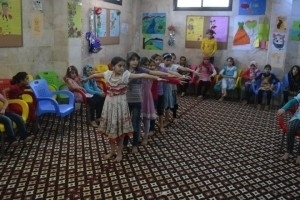For just a few hours a day, many of Kfar Nabel’s children gather in a small basement to forget the war planes and battles that overshadow both their present and their future.
These are the headquarters of the Child Care Project, launched by several local activists to offer psychological and educational support to children suffering the effects of war.
Kfar Nabel, which is under opposition control, lies in the suburbs of southern Idleb with a population of around 30,000.
Around 20 young men and women run the project, which is hosted by the Offices of the Revolutionary Unions.
“The Child Care Project was launched in Kfar Nabel five months ago,” the project’s assistant manager, Hasan al-Ahmad, told Damascus Bureau. “It’s a new experience where we’re trying to mitigate the psychological effects of the war on the city’s children. Around a year and-a-half ago we started, with the limited means we had, with a small initiative called the Dignity Bus.”
This carried a team travelling between the schools used to house displaced children and their families, singing educational and entertaining children’s songs and screening cartoons.
The project used laptops, projectors, and sound equipment and was welcomed by the children and their parents, who began to await the Dignity Bus team with much anticipation.
The initiative received a small amount of funding from the Organisation of Syrian Mothers, and the team was sent to Turkey to attend two training courses on the provision of psychological support in collaboration with the Lebanon branch of the Dutch organisation War Child.
Al-Ahmad said that the team studied a curriculum of six books over several sessions. According to one of the trainees, these combined theoretical lectures on child care and rights with case studies that demonstrated various situations and means of support. They were also taught mental, physical, creative and communication based games.
“We work with around 700 children of both genders whose ages range from six to 14,” said project manager Firas al-Omar. “They are distributed between two centers, where they receive psychological support and participate in various activities such as drawing, sewing, reading and recycling.
They also take part in physical activities and entertainment such as competitions, singing, and visual presentations,” he added.
Al-Omar noted that the children showed considerable improvement in a number of ways.
At first, they would draw war planes, tanks and other weapons, but six months later they started drawing flowers, natural landscapes, cartoon characters and animals.
Mohammad, 12, hopes these activities continue even after the war, expressing his appreciation for the efforts of the project team in teaching them new skills.
Al-Omar said that the project’s financial support was derisory at a time when it was most needed, with plans to open more centrers in nearby villages and train more personnel.
That’s just what Oum Rami, a mother of two, wants to happen, so as to serve all the city’s neighborhoods and nearby villages.
The centres are located in neighborhoods that are generally considered to be safe, and for Oum Rami, they are oases for children where they can breathe, move, and express themselves freely.
The Child Care Project focuses on modifying childhood aggression through the use of drama. Children act out scenes that depict hostile situations and their negative consequences, then come up with ways to handle them without violence.
The project also uses children’s music videos taken from TV channels, particularly the Birds of Paradise channel. The songs are explained to the children and applied to their current circumstances.
Wi’am, nine, is terrified every time she hears planes and shelling. Staying at one of the two centers makes her feel safe and allows her the space to play with friends.
Human rights and childrens’ organisations have highlighted the impact of various forms of armed conflict on children. While many youngsters are killed, maimed or orphaned, others are denied basic rights such as education and health care.
“My children used to suffer from a tremendous amount of stress because they were unable to play with their friends or leave the house,” mother-of-three Oum Hameeda said. “It became like a prison for them because of the situation. Since the Child Care Project began, my children are always there. After around two months I noticed a vast improvement. They were more open and trusting, and able to pursue their interests and develop their talents.”
“Children don’t feel safe at home and there is nothing to distract them,” said father-of-two Abu Mahmoud. “They can’t even watch children’s shows on TV because of the electricity cuts. These centers are like a gift to parents and children alike. They found freedom there and began to forget the reality of war they were living in.”
......


